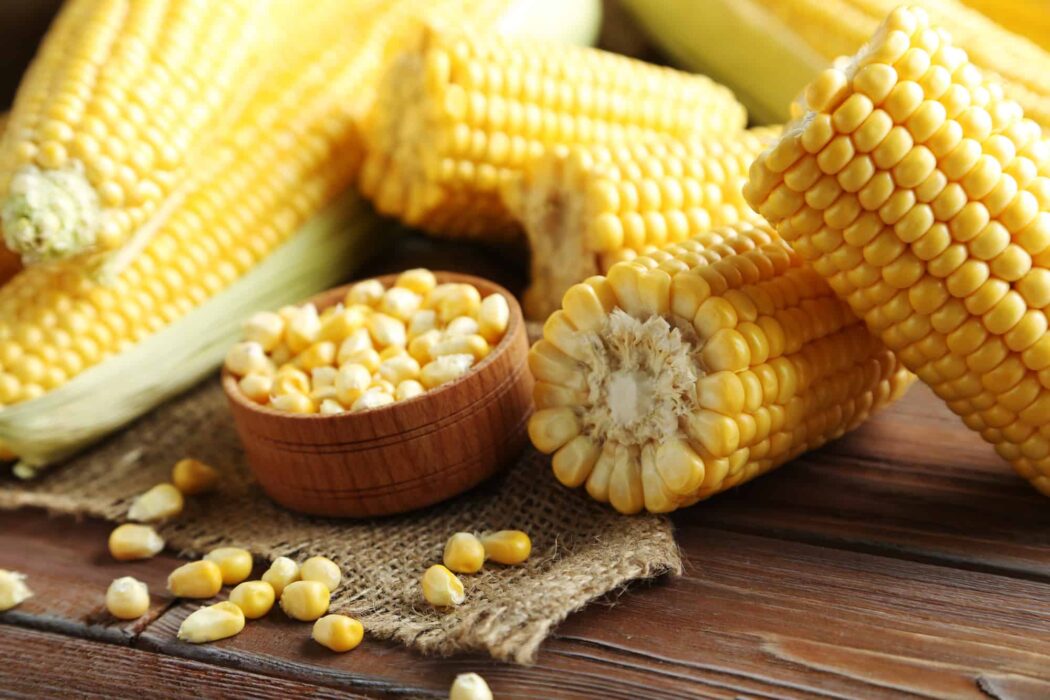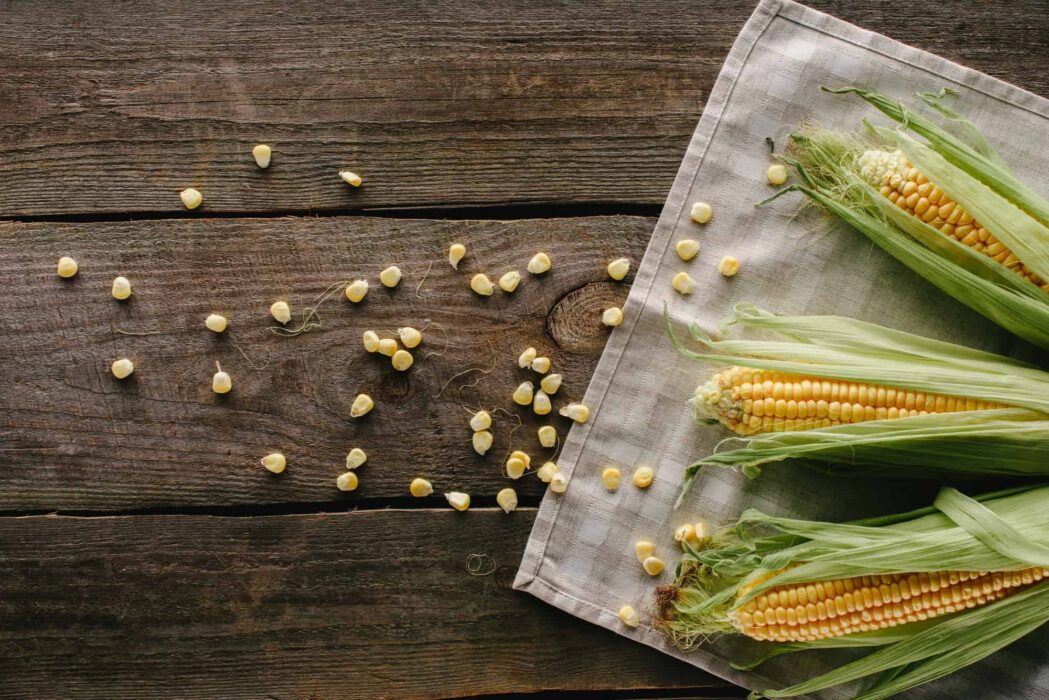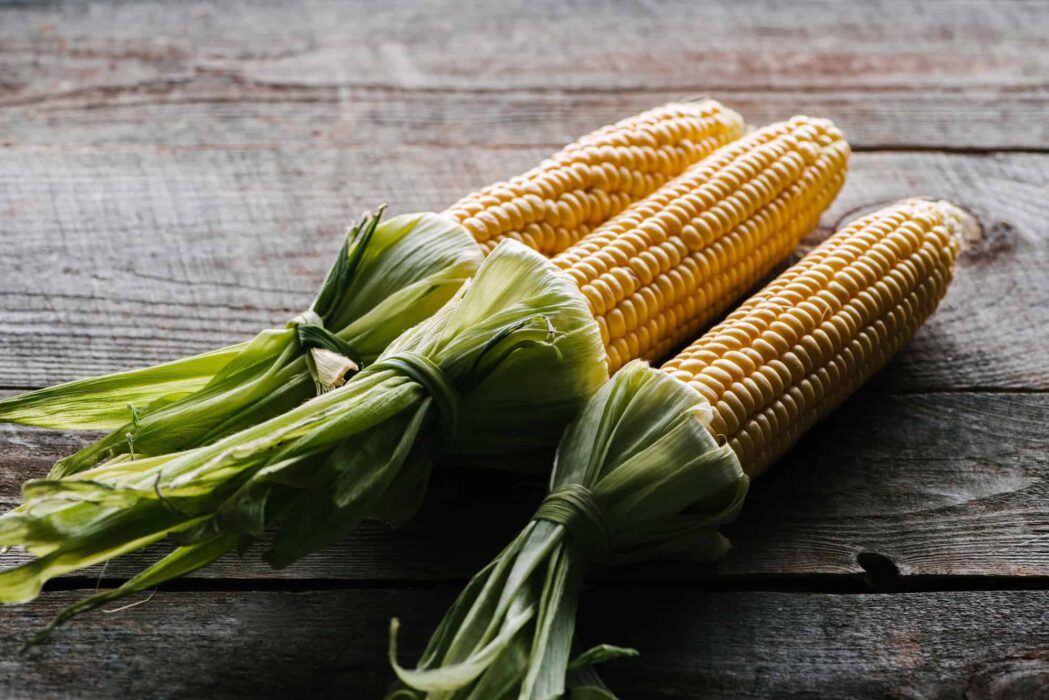Many of us love corn, and it has long been a part of the modern human diet. We’ve already found out that you can occasionally consume a glass of popcorn during stable keto as long as it’s free of additives and sweet toppings. We have also figured out that corn flour is not keto. What about the corn itself? Can you add it to your menu on a low-carb diet? Is corn keto?
The simple answer is no. Corn is not keto as it contains too many carbohydrates, and even a small serving can interrupt your ketosis. Corn raises blood sugar levels and leads to insulin spikes. However, you can afford corn as seasoning if you follow a moderate low-carb diet that allows up to 50 grams of net carbs per day.

So how many carbs are in corn? Can you have corn on keto? How much corn can you eat on a moderate low-carb diet? What are the health benefits of corn? Are there any contraindications? Find out all the details in our article!
What is Corn?
We all know what corn is. These are oblong cobs with yellow, juicy seeds. However, if you ask what type of plant corn can be attributed to, most people will not be able to answer. Grain? Vegetable? Or maybe even a fruit? For some reason, some people think that these are legumes.
Corn comes from a genus of plants in the family of cereals. This plant is tall, often with stems exceeding 10-14 feet, and due to this growth, it has a well-developed root system located both underground and above it.
Should I Count Calories on Keto?
According to the botanical definition, corn is still a cereal and a fruit. However, if you look at the culinary definition, this plant is a vegetable. A fairly common misconception is that a vegetable is an unsweetened fruit that is used to prepare main dishes, while anything sweet is a fruit and should be served for dessert. It turns out that, in general, corn is a vegetable, a cereal, and a fruit.
It should be noted that grains are in many ways similar to legumes, and what they have in common is that people eat the juicy part of the plant. They can be processed into cereals or canned as a vegetable or fruit. So, let’s talk about carbs in corn.
Is Corn Keto?
How many carbs are in corn? So, 100 grams of corn contains:
- 96 calories
- 4 grams of protein
- 5 gram of fat
- 6 grams of carbohydrates
- 4 grams of fiber
- 2 grams of net carbs.
As you already know, the classic keto diet limits your daily carbohydrate intake to 20 grams per day. And most of these carbs should come from green, leafy vegetables. Even a small serving of corn can disrupt your ketosis. So corn is not keto and should be avoided during a strict ketogenic diet and if you want to lose weight. If you need a cornstarch substitute for baking, there are several low-carb options. People often ask “how many carbs in corn on the cob” is, but the number of carbs does not depend on the cob.
However, suppose your goal is a healthy keto diet and a desire to avoid carbohydrates without needing to lose weight. In that case, you can increase your daily carbohydrate intake to 30-50 grams per day. You can afford a small serving of corn to complement your main meal, as corn has many health benefits.

What are the Health Benefits of Corn?
Corn grains are rich in vitamins: PP, E, D, K, B vitamins (B1, B2), as well as ascorbic acid. The cobs of this plant contain valuable minerals: salts of potassium, calcium, phosphorus, iron, and magnesium, as well as trace elements: nickel and copper. Essential amino acids are present in corn protein: tryptophan and lysine. Let’s take a closer look at the health benefits of corn.
Vitamin PP
Vitamin PP, niacin, or nicotinic acid improves carbohydrate metabolism, has a vasodilator effect, and promotes wound healing. This vitamin has hypolipidemic activity. It causes a decrease in the total level of cholesterol, atherogenic low-density lipoproteins, and especially triglycerides.
Vitamin E
Vitamin E is an essential antioxidant that protects cells and tissues from damage by free radicals produced by toxins and oxidized (acidic) fats. Regular consumption of food containing vitamin E can significantly reduce the risk of cardiovascular, oncological, and several other diseases, help prolong active life.
Vitamin D
Vitamin D plays a major role in bone development by helping your body absorb calcium. It is necessary for normal blood clotting, regulation of the heart, and the nervous system’s activity. It is a fat-soluble vitamin absorbed along with other fats through the intestinal wall and concentrated mainly in the liver.
Vitamin K
The main function of vitamin K in the body is to ensure normal blood clotting. It takes part in catalytic processes that give the protein prothrombin and blood coagulation system the ability to bind calcium. It, in turn, is necessary for forming thrombocytes and developing a blood clot. In addition, vitamin K plays an important role in the formation and repair of bones.
B Vitamins
B vitamins strengthen the nervous and endocrine systems and are an anti-stress and energy source. And regular use of vitamins of this group slows down the aging process of the body. Corn contains a large amount of vitamins B1 and B2.
Vitamin C
Vitamin C is involved in many oxidation reactions and the biosynthesis of special proteins of the connective tissue: collagen and elastin. These are the supporting components of cartilage, bones, and vascular walls.
This vitamin is involved in the oxidation and elimination of cholesterol from the body. It plays an important role in preventing lipid metabolism disorders leading to the development of one of the most dangerous diseases – atherosclerosis.

Iron
Iron is a chemical element vital for the human body. It has a central role in the hemoglobin molecules present in red blood cells. Iron is responsible for delivering oxygen to tissues and transporting carbon dioxide to the lungs. This element also takes part in metabolic processes, physicochemical processes leading to energy production in the body, and DNA synthesis.
11 Keto Supplements to Kickstart your Low-Carb Diet
Magnesium
This element is involved in forming ATP molecules and takes part in obtaining energy from cells. Without it, the metabolism of B vitamins, as well as vitamin C, is impossible. In fact, these vitamins cannot benefit our body without biochemical processes involving magnesium.
Magnesium, interacting with calcium, affects bone growth, reduces joint pain, regulates muscle tone, and relieves cramps. It affects the strength of blood vessels, lowers blood pressure, and eliminates premature heartbeats. By interacting with insulin, magnesium promotes its penetration into cells, thereby regulating glucose levels.
Nickel
Nickel takes part in the activation of enzymes, hematopoiesis, and the formation of genetic information. It prolongs and enhances the action of insulin, has a beneficial effect on the activity of the kidneys and pituitary gland, and helps cell membranes and nucleic acids in maintaining their structure. Nickel supplies oxygen to tissue cells and, as a result, has the feature of reducing blood pressure.
Copper
Copper is involved in many processes in the body. For example, together with iron, it takes part in the formation of erythrocytes – red blood cells. It is also a key component of collagen, our main structural protein. In particular, it participates in the creation of a system of collagen and elastin fibers. The elasticity of the skin and blood vessels depends on the quality of this system.
Potassium
Potassium regulates water balance in the body and normalizes the heart rhythm. It affects the functioning of many cells in the body, especially the nerves and muscles. The biological role of potassium in the human body is great because it promotes mental clarity, improves the supply of oxygen to the brain, helps to get rid of toxins, and acts as an immunomodulator. Potassium helps lower blood pressure and helps treat allergies.
 Calcium
Calcium
Calcium participates in the processes of excitability of nervous tissue, muscle contractility, and blood coagulation processes. It is a part of the nucleus and membranes of cells, cellular, and tissue fluids and has antiallergic and anti-inflammatory effects. Calcium prevents acidosis and activates a number of enzymes and hormones. It is also involved in the regulation of the permeability of cell membranes.
Phosphorus
Phosphorus is a trace element vital for the normal functioning of the body, namely the kidneys, liver, heart, and brain. It is essential for the health of internal organs, joints, and teeth. Also, this trace element takes part in the regulation of hormone levels.
Tryptophan
In the body, L-tryptophan converts into serotonin, which helps control mood and sleep. Serotonin is an important neurotransmitter in the body. A decrease in serotonin levels can lead to sleep disturbances, increased stress levels, and potential eating disorders. Emotional imbalance, deterioration of the nervous system, and an increased risk of depression and anxiety symptoms are also consequences of low serotonin levels.
Lysine
Lysine has a wide range of biological effects, and, above all, lysine is vital as a component of body proteins. This amino acid is found in large quantities in collagen, which provides strength to muscles, cartilage, ligaments, and tendons.
Indirectly, lysine strengthens bones as it promotes the absorption of calcium from the intestines. With a lack of it, osteoporosis (increased fragility of bones) can develop. Lysine plays an important role in the immune system as it is required in large quantities for the production of antibodies (immunoglobulin). Lysine is part of hormones and enzymes that regulate the body’s metabolic processes.
Is Corn Dangerous For Your Health?
Corn is a grain, so it can cause allergies. For some people, grains create severe discomfort and stress in the gastrointestinal tract. Other symptoms that can result from consuming grains include skin irritation such as skin rashes or hives, nausea, stomach cramps, indigestion, headaches, or asthma.
Unfortunately, corn grains (or any food with corn as the main ingredient) can cause inflammation as well as raise blood sugar and can create gut problems. If you have any of these symptoms, you should completely eliminate corn from your diet, avoiding it even in small amounts.

Conclusion
As you can see, corn is not keto. It contains too many carbohydrates, and even a small amount can interrupt your state of ketosis. If your goal is weight loss during the keto diet, corn isn’t part of your nutritional plan. For this reason, you should avoid it during your ketogenic diet.
Carbs in Tortillas: How to Choose the Right One for Keto?
However, if you’re on a mild low-carb meal plan, you can add a small amount of corn to your menu as an addition to your main meal. Thus, you will receive all the useful elements that corn contains.